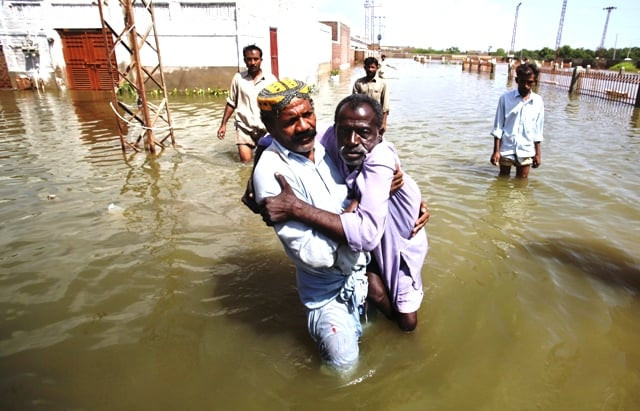Floods — a repeat of last year?
For a multitude of reasons, the floods that have devastated Sindh have not received the attention they deserve.

This of course is the bigger picture, encapsulated, if you will, from a distance. Zoom in closer and one will find images of unrivalled misery (and correspondingly, massive official neglect and ineptitude); there are the families who lack anything to eat; the babies and young children stricken with illness and those who search desperately for missing family members or food and clean drinking water. Those affected have now been complaining for the past few days that they have received too little help and in some cases been left to fend entirely for themselves. The task the Sindh government has faced has of course been no easy one either – with all 23 districts of the province affected. Worse still is the news from the weather forecasters that the rains are not likely to stop anytime soon, and that the torrential downpours Sindh and parts of south Punjab have seen, may continue till mid-October. It is almost unbearable to imagine what kind of suffering this will inflict on people who are already helpless and have lost their means of livelihood, watching standing crops destroyed and livestock taken away by churning flood waters that have surrounded villages with the Navy now called in to rescue marooned people.
As agencies bring in their experts and the World Food Programme starts distributing urgently needed food aid, there are already some assessments coming in, which suggest the challenges posed are even worse than what confronted aid workers last year. In the first place, it is being said that since people are not assembled in specific places but are widely scattered, makes it harder to deliver aid to them. While camps have been set up, facilities are poor, and many people, uncertain of where to go, are simply camping along roadsides. This state of affairs makes it harder to deliver to them the food, clean water and sanitation that they so desperately need, raising the threat of disease in the future. In such circumstances the most vulnerable are of course at worst risk, with Unicef expressing great concern about the welfare of some 2.5 million children. Some have still to recover from the calamity of 2010 and are thus less able to face the new perils that have swamped them, driving entire villages into a nightmarish scenario they had hoped they would never see again.
The question is, could all this have been prevented? Before the monsoon rains began to fall this year more than one major agency had warned that the lack of disaster preparedness placed people at risk. This, of course, is true. We need better planning, more efficient means to evacuate people and the ability to establish camps swiftly in key places. But perhaps what we need most of all is a major overhaul in policy planning and a diversion of funds away from defence, debt servicing and administration so that we are able to spend more on people, offering them better housing, nutrition, healthcare and other basic amenities of life. Doing so would help them immeasurably in coping with the national disaster that they keep having to face again and again.
Published in The Express Tribune, September 16th, 2011.















COMMENTS
Comments are moderated and generally will be posted if they are on-topic and not abusive.
For more information, please see our Comments FAQ